Retail Insights
Wales - Minimum Unit Pricing
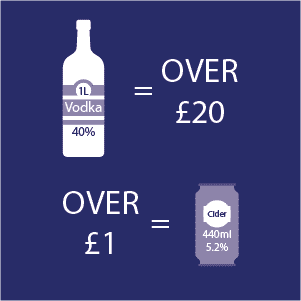
The Public Health (Minimum Price for Alcohol)(Wales) Bill was given Royal Assent on the 9th of August 2018, meaning it is now law. Cheap, strong alcohol will experience a price rise in Wales due to the new MUP (Minimum Unit Pricing) legislation. Excess alcohol consumption has been estimated to lead to nearly 55,000 alcohol-related hospital admissions a year costing the Welsh NHS over £150m. The new law supports the Welsh government’s strategy to tackle hazardous and harmful drinking by affecting the affordability and the availability of cheap, strong alcohol. The minimum price per unit of alcohol is yet to be finalised, however, the Welsh Government have proposed a price of 50 pence per unit. This will come into force in the Summer of 2019.
This follows what has been happening in Scotland, where Minimum Unit Pricing was introduced on the 1st of May 2018. In Scotland, the minimum price per unit (ppu) is set at 50 pence. So, a litre bottle of vodka with about 40 units of alcohol would have to be priced at over £20.
Category Performance
Using sample data from 129 TRDP stores in Scotland, we have been able to identify a number of changes that may have been caused by the introduction of Minimum Unit Pricing. Surprisingly, across the sample, alcohol sales increased by 14.9% between the May to July period from 2017 to 2018. The MUP legislation was introduced as an effort to reduce the alcohol consumption and prevent alcohol-related illness or injury in Scotland, yet the consumption of alcohol in some alcohol sub-categories has in fact increased. Spirits, Beer, Wine, and Ready to Drink Premixed products all saw an increase in the number of units sold from 2017 to 2018. It was Cider and Pear Cider that saw a significant decrease in the number of units sold, yet still saw an increase in the gross sales value due to an increase in the average ppu.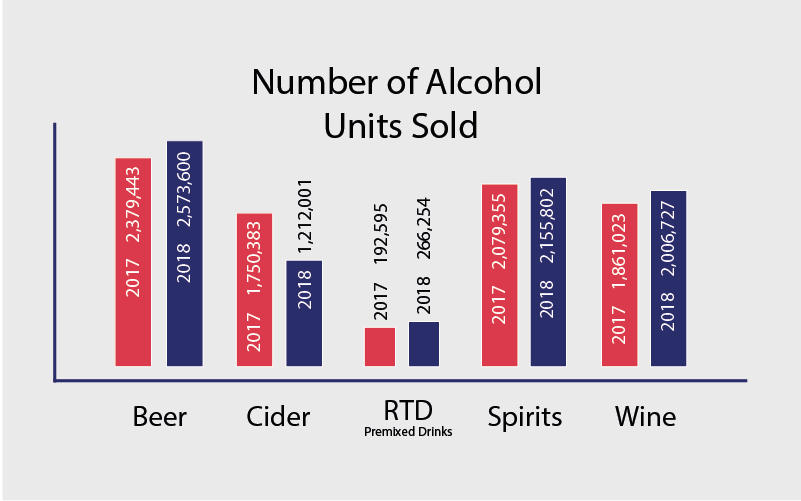
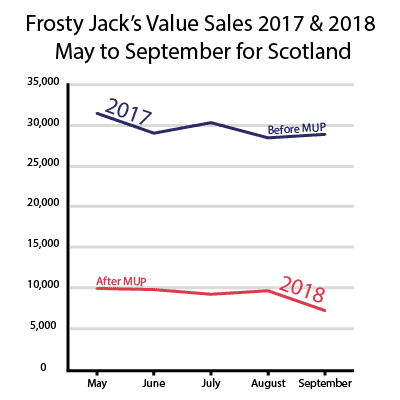
High Strength Cider
The low price and large pack size of White Cider have historically made it a popular product among some consumers, but also a target for concerned legislators. Frosty Jacks has specifically seen a downturn in value sales, experiencing a 70% decrease from May to September, year on year (YoY) from 2017 to 2018. The popularity of Frosty Jacks has been affected by the MUP legislation due to the price increase meaning that in 2017, (May – September) when the MUP wasn’t in place, the sales value for Frosty Jacks was at £148,605 and in 2018, over the same period, it dropped significantly to £46,289. In 2017, the price of a 3 litre bottle of Frosty Jacks was £3.69, where as after the MUP increase, it cost £11.25 for the same 3 litre bottle, a 205% price increase.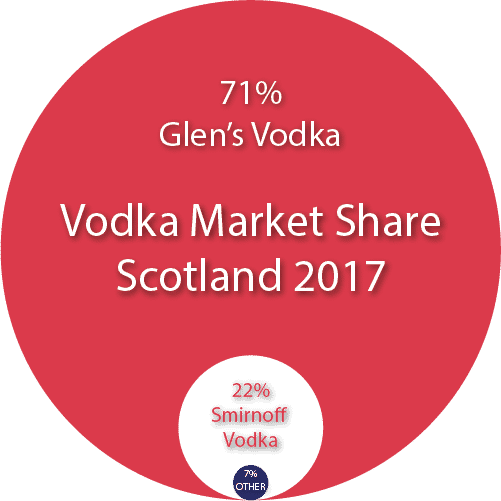
Closing price gap
One effect of minimum unit pricing is the closing price gap between budget and premium lines. One example of this is Smirnoff and Glen’s Vodka. Historically, premium Smirnoff’s higher cost has meant lower unit sales than its cheaper competitor Glen’s but post MUP, we have seen an increase in the market share of Smirnoff and a decrease in Glen’s. Instead of opting for Glen’s, consumers are now choosing premium, similarly priced products. Glen’s Vodka lost 5% of their market share since the introduction of MUP. Smirnoff gained 3% of this market share whilst the other 2% went to the other vodka alternatives in the market such as Absolut, Chekov, Grey Goose, and many more.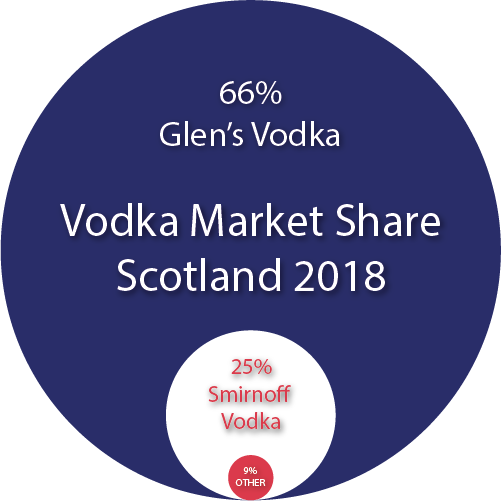
MUP Compliance
In July, after 3 months of MUP, we saw a number of products with a unit price of less than 50 pence, some example of non-compliant lines are ‘Perla’, in which almost 40% of the stores stocking the Polish Beer sold it at a non-compliant price, and ‘Karpackie Super Mocne’, which was non-compliant in about 20% of the stores that stock it. One explanation for this is Price Marks printed before May 2018 which are now incorrect and some confusion whether or not to charge above the advertised price. In terms of MUP, alcohol products must be sold at or above the minimum price, even if this is at odds with branding.
MUP Effect?
As shown, the MUP Legislation has had a substantial effect on certain categories in terms of unit sales. Yet, overall MUP is beneficial to convenience store retailers as it levels the playing field to a degree (supermarkets are also bound by MUP laws) and the demand for alcohol has increased in all categories except ‘Cider’. The same effect may be seen in Wales, leaving retailers with a significant boost to their alcohol sales.Get free insights directly to your inbox
By submitting the above form, you consent to receive insights emails from ShopMate and Retail Data Partnership.
Click here to view our privacy policy
Read More
2
Minutes
Minutes
Getting the best EPoS performance
How to get the best performance and most up to date features on your ShopMate EPoS
25th July 2024
5
Minutes
Minutes
The benefit of MediaMaster Branded Ads
We monitored sales of the new McVitie's White Chocolate digestives in convenience stores with and without MediaMaster Screens.
27th June 2024
7
Minutes
Minutes
Retailer Profile - Seaborn Stores
We discuss refits, family and community with Kelly Allen from Seaborn Stores in Morecambe Lancashire
27th June 2024
 01780 480 562
01780 480 562